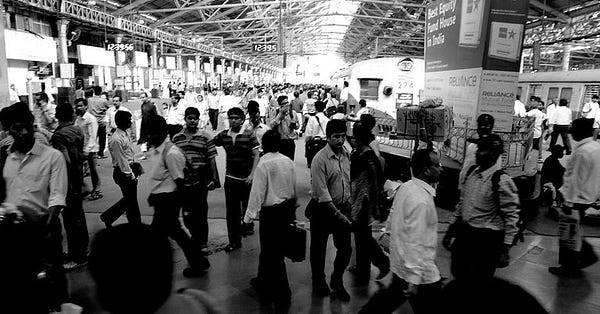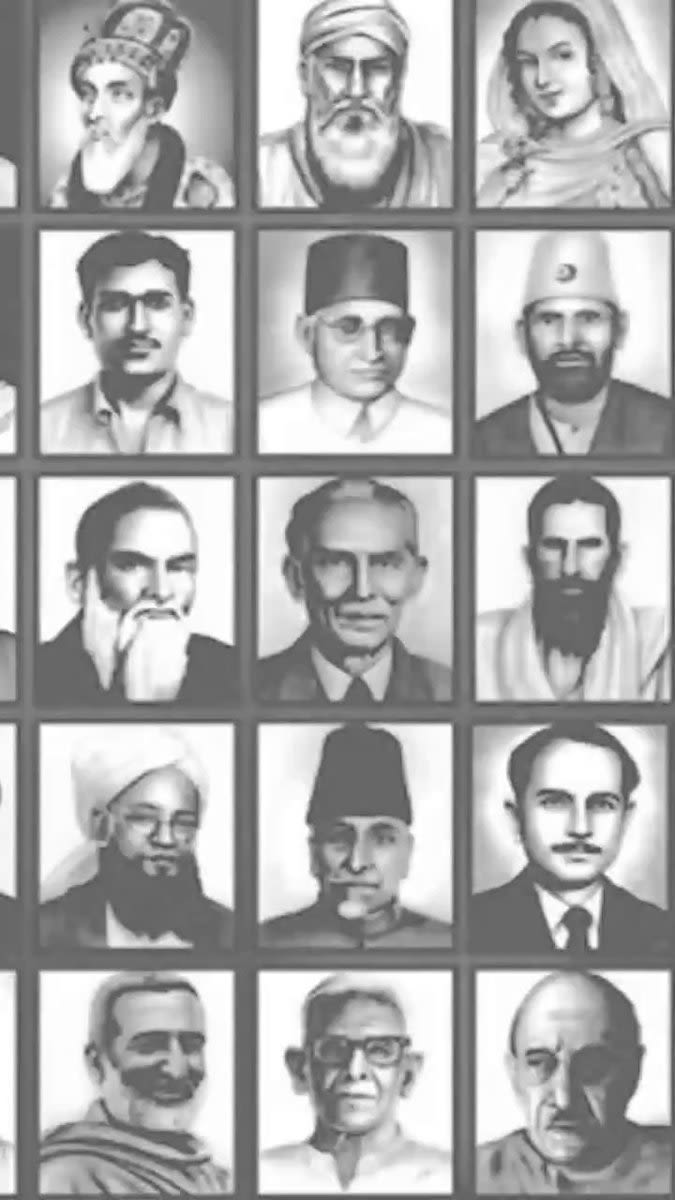Kerala Muslim groups unite against “forced liberalism”, Kashmir’s unending wait for democracy, India’s Muslim men are more monogamous than others
Issue-36 | August 12, 2022
Muslim groups remember community’s contributions to India’s freedom struggle, Lesson on Hindu-Muslim amity from Tamil Nadu, Death of four Muslim men in Bengal jail, Haryana police’s harassment of Rohingya refugees, Muharram rituals pass with unease in UP & Kashmir, New rules for Bengaluru Corporation polls bad for sitting Muslim councilors.
- A Weekly Read on Issues, Struggles & Positive Trends. From Empower India Foundation.
Kerala Muslim groups join hands against imposition of “liberal, gender-neutral” ideas
Muslim organisations in Kerala asked the state government to withdraw from the moves to impose “gender-neutral ideas” in educational institutions. After a joint meeting of the groups in Kozhikode, Panakkad Syed Rasheed Ali Shihab Thangal, a senior Muslim leader associated with the IUML party, told reporters it is highly objectionable that the Left government was trying to implement liberal ideology in educational institutions. “Kerala society gives much importance to moral principles and family structure and majority of people in Kerala are religious believers,” he said, adding that democracy means allowing people to follow their faith and lifestyle. “Followers of religion have their own sets of principles and beliefs and trying to impose liberal ideology and cancelling those entire ideals amount to fascism,” Thangal said.
Muslim groups commemorate India’s Muslim freedom fighters
The All India Majlis-e-Ittehadul Muslimeen (AIMIM), a Muslim political party based in Hyderabad, decided to organise a public meeting commemorating the role of Muslims in India’s freedom movement. The public meeting on ‘Role of Muslims in India’s Independence’ will be held in Hyderabad on August 12. Other Muslim groups are also holding similar programmes—both online and offline—as this month marks 75 years of India’s independence. The Popular Front of India (PFI), another Muslim group, are running a social media campaign honouring the Muslim and other freedom fighters.

Muslim men are more monogamous than their Hindu, Christian counterparts in India
Among the men of all religions in India, Muslims and Jains mostly maintain single sexual partner. Hindu men ranked at the top when it comes to having multiple sexual partners in India. They are followed by Sikhs, Christians and Buddhists, revealed an analysis of National Family Health Survey. According to the survey, the Hindu men had on average 2.2 sexual partners in their lifetime’. Sikhs and Christians had 1.9, while Buddhists and Muslims had 1.7, on an average. Jains had the lowest: 1.1. The findings of the survey are important especially amid Islamophobic propaganda against Islam’s permission for polygamy. The survey suggested that Hindu men, whom the law doesn’t allow to have more than one wife, find sexual partners outside marriage.


3 years after New Delhi’s August 5 move, Kashmiri leader Mirwaiz Umar Farooq still in detention
More than three years after the BJP-led Union government unilaterally cancelled Article 370 of the Indian Constitution, senior Kashmiri leader Mirwaiz Umar Farooq continues to remain under detention at his Srinagar residence. The leader of the moderate faction of Kashmir’s Hurriyat Conference (Freedom Movement) was detained on August 4, 2019, a day before the Modi government cancelled the provision in the Constitution that granted special semi-autonomous status to Jammu and Kashmir, the only Muslim-majority state in India until then. Umar Farooq was one of many leaders across separatist and pro-India parties who were detained ahead of the New Delhi move, including three former chief ministers. In the same move, the Modi government had also ended the statehood of Jammu and Kashmir, bringing the region under the direct control of New Delhi and further alienating its people.
J&K’s wait for democracy continues
Despite repeated statements by the Bharatiya Janata Party-led Union government, the restoration of democracy, and the assembly elections, in Jammu and Kashmir (J&K) appear unlikely to occur soon. Regional politicians are raising such concerns citing the Election Commission of India’s delay in publishing the final electoral roll, a mandatory process before election dates are announced. J&K has been without an elected government since June 2018, when the BJP abruptly withdrew support to Mehbooba Mufti’s People’s Democratic Party-led coalition government. What the J&K is witnessing is the third longest spell of bureaucratic rule in any state or Union Territory with a legislature in independent India’s history.
Wracked by violence, stress & unemployment, soaring heroin addiction is destroying Kashmir’s young men and women
Drug abuse in Kashmir is rampant, with the main rehabilitation facility in Srinagar reporting a 2,660 % increase in patients seeking treatment since 2016, primarily for heroin addiction. The number of people who require help is twice the national average. The addicts include rich and poor, employed and unemployed and overwhelmingly young. Three Kashmiris, who have suffered multiple relapses, revealed how easily heroin is available and the toll it has taken on their lives in a conflict-ridden region, which is one of the world’s most-militarised zones. The region also sees rising numbers of women involved in the drug abuse.


Hindu extremist lawmaker with a long criminal record & penchant for anti-Muslim hate speeches is vital to BJP's Telangana push
Led by Prime Minister Narendra Modi, the Bharatiya Janata Party (BJP) has begun a big push to win Telangana in 2023, when the assembly polls are due in the state. The man vital to its polarising campaign is a two-time member of legislative assembly, Raja Singh, who stays in the limelight because of his anti-Muslim hate speech and criminal record. More than 40 criminal cases have been filed against him in a 13-year-old career. However, he was never sent to jail.
4 Muslim men die in one week in the same Bengal jail, government claims ‘coincidence’ before probe ordered
In West Bengal, four Muslim men died in judicial custody within a period of 10 days. The deaths – of Abdul Rajjak, Jiyaul Laskar, Akbar Khan and Saidul Munsi -- were reported at the Baruipur Central Correctional Home, in South 24 Parganas district. All the four men had been picked up by the West Bengal police in separate cases in the last week of July. The families of the four deceased men alleged foul play and raised doubts about the causes of their deaths, openly stating their suspicions that the men were grievously tortured to death. Official did not make the postmortem reports public, and the police sources called these deaths just “a coincidence”. Later, after media reports and public outcry, the government ordered a probe into the deaths and announced compensation for the victims’ families.


Rohingya refugees in Haryana accuse police of harassment, brutality
In late July this year, 10 police jeeps and six police buses encircled the 10 Rohingya refugee camps in the Nuh district of Haryana. More than 600 policemen walked into the camps of the Muslim refugees from Myanmar and allegedly barged into each jhuggi, or makeshift home, and pushed people out of it to carry out a ‘verification drive’. “Darwaza kholo warna darwaza tod dunga (Open the door or we will break it down) -- that’s what the policemen shouted at 4.30 am,” recalled a woman in her 30s. According to Nurbahar, another Rohingya woman in her 60s, the police had hit her, her son, her daughter-in-law and her daughter-in-law’s sister with lathis. This was because a 17-year-old young Rohingya woman, a resident of a camp in Bengaluru who’s also a patient of acute tuberculosis, had come to stay with her sister in Nuh. At least in Haryana, the Rohingya refugees in India are not allowed to leave even the area of their biometric registration, let alone the state. So the police decided to punish this sick girl by thrashing her with lathis, and also thrashed the other inhabitants of the jhuggi for providing her with shelter.
Tamil Nadu: Hindus and Muslims, helped by civic administration, set example of communal harmony
Hindus and Muslims of V. Kalathur village in Tamil Nadu’s Perambalur district decided to bury their century-old dispute and amicably join hands for the collective development. The Hindu-Muslim hostility at V Kalathur village remained unresolved for almost a century. The conflict began reportedly in 1912, regarding the organisation of a Hindu temple festival. The Selliyamman temple festival, which is held every year during the last days of July and early August, spans three days and involves processions with the deity that’s taken through the village streets, including ones on which Muslims live. According to reports, the district administration made intense efforts to help the communities solve the dispute and move ahead.
Muharram processions: event held in Hyderabad, permission denied in Kashmir, rally turns violent in UP
Authorities and anti-social elements made trouble for annual Muharram processions in some parts of Kashmir and Uttar Pradesh. In Kashmir’s Srinagar, officials imposed curfew-like restrictions at the city centre, Lal Chowk, and other parts of the city. On August 7, Srinagar city bore a deserted look as the administration imposed strict restrictions and several roads were blocked with barricades and concertina wire to prevent people from gathering. Besides, government forces were deployed in large numbers. Photos captured by a Kashmiri photographer gave glimpses of life in Kashmir during the restrictions. In Hyderabad, the annual procession was held as usual. In Uttar Pradesh’s Bareilly, some people from the Hindu community complained about the use of a DJ during a procession. They also allegedly hurled stones and those participating in the procession retaliated, causing injury to some people.

Bengaluru Corporation elections: several sitting Muslim councilors cannot contest due to new reservation rules
Several Muslim former corporators of Bengaluru Corporation (Bruhat Bengaluru Mahanagara Palike - BBMP) are likely to lose their sitting seats if the draft notification on ward reservation, which was recently released by the civic authorities, is approved. Most Muslim-majority wards have now been proposed to be reserved for candidates from the Scheduled Caste/Scheduled Tribe (SC/ST) communities or from women. For example, Abdul Wajid, a Muslim leader from the Indian National Congress (INC), will not be able to contest from his Manorayanapalya seat. His ward is now reserved for Backward Classes A (Women).
Drought and sudden rain cause huge losses for Kashmir’s paddy farmers
In April this year, the Jammu and Kashmir administration issued an advisory to farmers, asking them not to cultivate paddy because of low discharge of water from nearby irrigation canals. This caused farmers, like Mudasir Ahmed of Anantnag district, to give up all hope for a good crop this year. Ahmed was one among the thousands of Kashmiri farmers who have been affected by the dryness and later sudden but paltry rains that upended their plans of cultivating paddy – and also their plan B of cultivating maize. The weather pattern was so disastrous during the cultivation season, which the experts attribute to the effects of climate change.


Participants expose “hidden agenda” of pro-government “interfaith conference”
Days after a controversial gathering of some religious personalities including Muslims, where some “resolutions” including against other Muslim groups were adopted, some participants revealed they were misled and kept in dark about the real objectives and agenda of the event. According to the media reports late last month, some Muslim clerics “unanimously supported” some resolutions, including one to ban the Popular Front of India (PFI), during an “interfaith conference” organised by All India Sufi Sajjadanashin Council (AISSC), a little-known group. The PFI is a Muslim group critical of Narendra Modi government and its Hindu majoritarian policies. Responding to media reports about the “resolutions” adopted in the event, participants of the event later said they were unaware of those resolutions. Though the event was described as an inter-religious event, it gained media attention for the participation of Ajit Doval, the national security advisor of the Modi government. The event spoke against hate, but avoided any mention of India’s Hindu extremist groups, which spread hate and unleash violence against the country’s religious minorities.
Thanks for reading!
Please send us your feedback: indianmuslimcable@gmail.com


